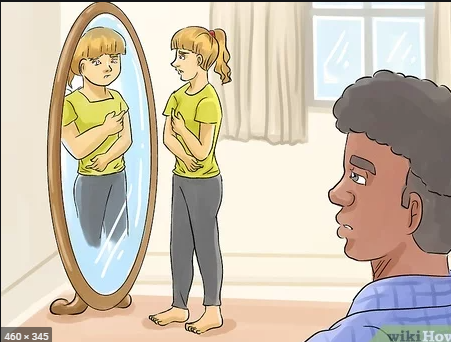We all have days when we feel insecure about a certain aspect of our appearance or think we don’t look our best. I’m sure most, if not all of us have something we don’t like about our physique. It might be the shape of your nose, complexion, height or the size or thickness of your lips. And though we may fret about our imperfections, its imperative we don’t allow this interfere with our daily activities.
However, if you find yourself spending a lot of time obsessing over, hiding or trying to correct what you see as flaws, you may have Body Dsymorphic disorder (BDD). Body Dsymorphic disease, is a mental health condition where, a person spends a lot of time worrying about flaws in their appearance. Simply put, the affected person is preoccupied with their perceived physical flaws.
People who suffer BDD think about their real or perceived flaws for hours each day, however these flaws are often unnoticeable to others. They can’t control their negative thoughts and don’t believe people who tell them that they look fine. Research shows this condition affects both men and women equally, but it’s most common in teenagers and young adults.
BDD can seriously affect ones daily life, including work, social life and relationships.BDD can also lead to depression, self-harm, and even suicidal thoughts. Just as any other mental health ailment, BDD symptoms can be relatively mild, moderate or severe. And each stage of symptoms requires specific treatment from a licensed health professional.
Causes of BDD
The causes of BDD is unknown but certain biological and environmental factors may contribute to its development.
- Genetics-you may be more likely to develop BDD if you have a relative with BDD, Obsessive Compulsive Disorder(OCD) or Depression.
- A chemical imbalance in the brain
- If you suffered a traumatic experience in the past:- you may be more likely to develop BDD if you were teased, bullied or abused when you were a child.
In some cases, people who suffer from BDD also suffer from another mental health condition, and generalized anxiety disorder or an eating disorder.
Symptoms of BDD
These are symptoms but not diagnosis for BDD, as such even if someone presents such symptoms, seeing a psychologist for assessment is the best way to have a proper diagnosis.
- Worrying a lot about a specific area of your body (particularly your face).
- Spending a lot of time comparing your looks with other people’s
- Looking at yourself in mirrors a lot or avoiding mirrors altogether
- Going to a lot of effort to conceal flaws
- Excessive time spent on grooming
- Believing that the perceived flaw will lead to negative judgment or mocking from others
- Seeking reassurance from others
Getting help for BDD
Just like any other health issue, people are predisposed to going to see their General Practitioner (GP). The GP will probably ask a number of questions about your symptoms and how they affect your life. With that the GP shall refer you to a mental health specialist for further assessment and treatment. Seeking help is important because your symptoms will not go away without treatment and may get worse.
BDD treatment
Symptoms get better with treatment from a licensed mental health professional. Treatment varies between therapy and medication. However, the most common treatment plan for BDD is a combination of psychotherapy and medication. Cognitive behavioral therapy has been found to be the most effective at treating BDD. And anti depressant medications have also shown to help individuals coping with this disorder.
Lifestyle and home remedies
- Stick to your treatment plan
- Learn about your disorder
- Pay attention to warning signs
- Practice learned strategies
- Avoid drugs and alcohol
- Get active
- Write in a journal
- Don’t become isolated
- Take care of yourself
- Join a support group
- Learn relaxation and stress management
- Don’t make important decisions when you’re feeling despair or distress
Suffering Body Dsymorphic Disorder does not in any way mean that you are vain or self obsessed. It can be very frustrating and this can take a heavy toll on your life. Caregivers are advised to be patient when caring for such persons.










